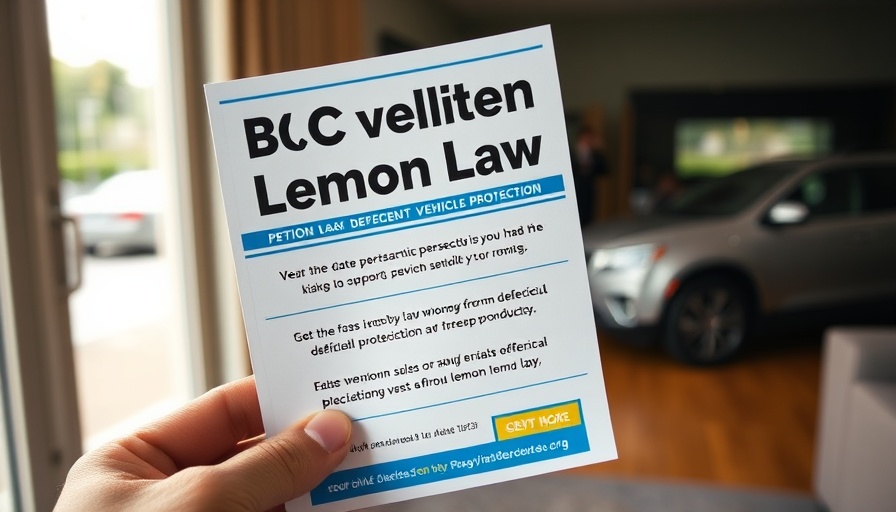
A B.C. Woman Takes Action for Consumer Rights
The call for better consumer protection in British Columbia has gained momentum, thanks to Nicole Pajak, a North Vancouver resident who is pushing for the province to establish a 'lemon law.' The concept is not new; it has seen adoption in various U.S. states, designed to help consumers who end up with defective vehicles. Pajak's petition comes after a distressing experience she had with her newly purchased 2023 Volkswagen all-electric ID.4, which she initially regarded as her dream vehicle.
Pajak's nightmare began shortly after taking delivery of her new car. She encountered persistent issues, including malfunctioning windows, a failing infotainment system, flickering interior lights, and a squeaky brake pedal. But the most alarming problem surfaced when the rear doors of the vehicle failed to open on several occasions, posing a significant safety risk, especially for her young son. Such incidents raise questions about vehicle safety standards and consumer rights, prompting Pajak’s determination to advocate for policy change.
The Lemon Law Concept: A Relief for Troubled Consumers
Lemon laws are designed to protect consumers by providing legal remedies when they purchase a defective vehicle that fails to meet quality and performance standards. They offer a legal framework for owners to seek refunds or replacements after repeated repair attempts. Pajak envisions a system where those in British Columbia can quickly recover funds for defective vehicles without battling lengthy and complicated processes.
Given the complexities involved in automotive purchases, especially with newer all-electric models that may come with unique software and hardware complications, Pajak’s advocacy is particularly relevant. According to consumer protection experts, lemon laws adjust to modern challenges in the auto industry, ensuring accountability for manufacturers who deliver subpar products.
The Experience of a Dismal Ownership Journey
Nicole Pajak's ordeal included an astounding number of trips to the dealership—almost 58 in total—with her vehicle spending nearly 90 days in the shop. Such experiences are not uncommon among consumers who purchase defective vehicles. This situation not only inconveniences vehicle owners but also raises serious concerns about safety and the mental strain involved in dealing with manufacturers and dealerships.
According to consumer reports, Pajak's issues reflect a broader pattern where manufacturers have become increasingly unresponsive to consumer complaints. This has fueled calls for stronger protections, including the potential adoption of lemon laws in other provinces across Canada.
Historical Context: Lemon Laws in Canada and Beyond
The necessity for lemon laws is recognized in various jurisdictions; however, in Canada, the lack of such comprehensive consumer protections has long been criticized. While some provinces have consumer protection laws in place, they often fall short of providing refunds or replacements for defective vehicles. By contrast, U.S. lemon laws vary state by state, with many providing robust protections that lead to successful settlements for affected consumers.
This inconsistency highlights the need for standardized protections across Canada, particularly as more consumers turn to electric vehicles like Pajak. By advocating for California-style lemon laws, B.C. could pave the way toward a more consumer-protective environment in the automotive market.
The Path Forward: Building Consumer Awareness and Solidarity
Pajak's petition illustrates the critical role of consumer advocacy in shaping policies that protect buyers. As she raises awareness around the need for lemon laws, it is essential for other affected consumers to share their experiences. Building momentum through shared stories will assist in gaining traction for the movement.
Organizations and advocacy groups can also play a significant role by educating consumers on their rights and encouraging them to support Pajak's initiative. Engaging local communities through forums and social media campaigns can amplify the message and urge lawmakers to act.
Taking Action: What You Can Do to Support Change
If you're a B.C. resident interested in consumer protection, consider signing Pajak's petition or sharing your own experiences with vehicle defects. Advocacy is most effective when voices unite in support of a common cause. Additionally, joining relevant consumer advocacy groups can strengthen efforts toward policy reform.
Your involvement not just aids Pajak's cause but potentially enhances the protection other consumers may gain against defective products in the future.
In conclusion, consumer rights in Canada require strengthening, as illustrated by Pajak's inspiring fight for lemon laws in B.C. The journey toward more robust protections promises to benefit countless consumers who deserve safety and reliability when purchasing vehicles. The conversation surrounding lemon laws provides an opportunity to reshape consumer rights - one petition at a time.
 Add Row
Add Row  Add
Add 




Write A Comment